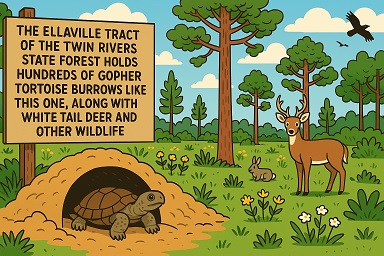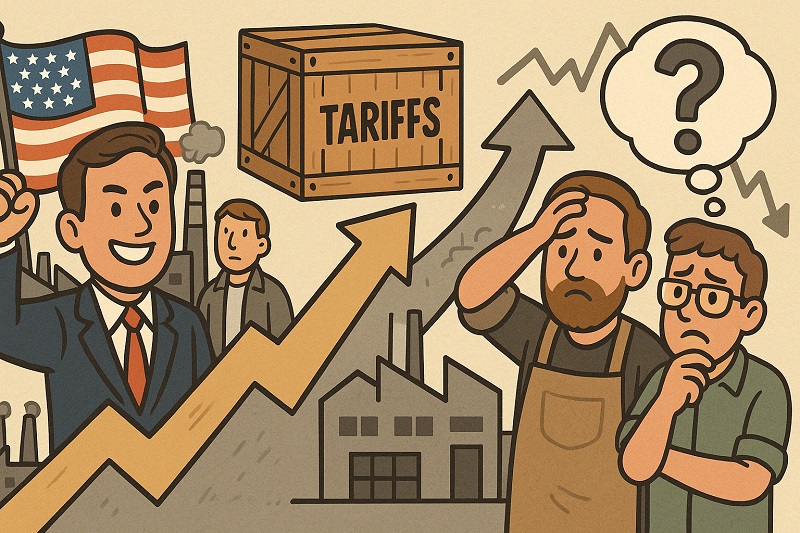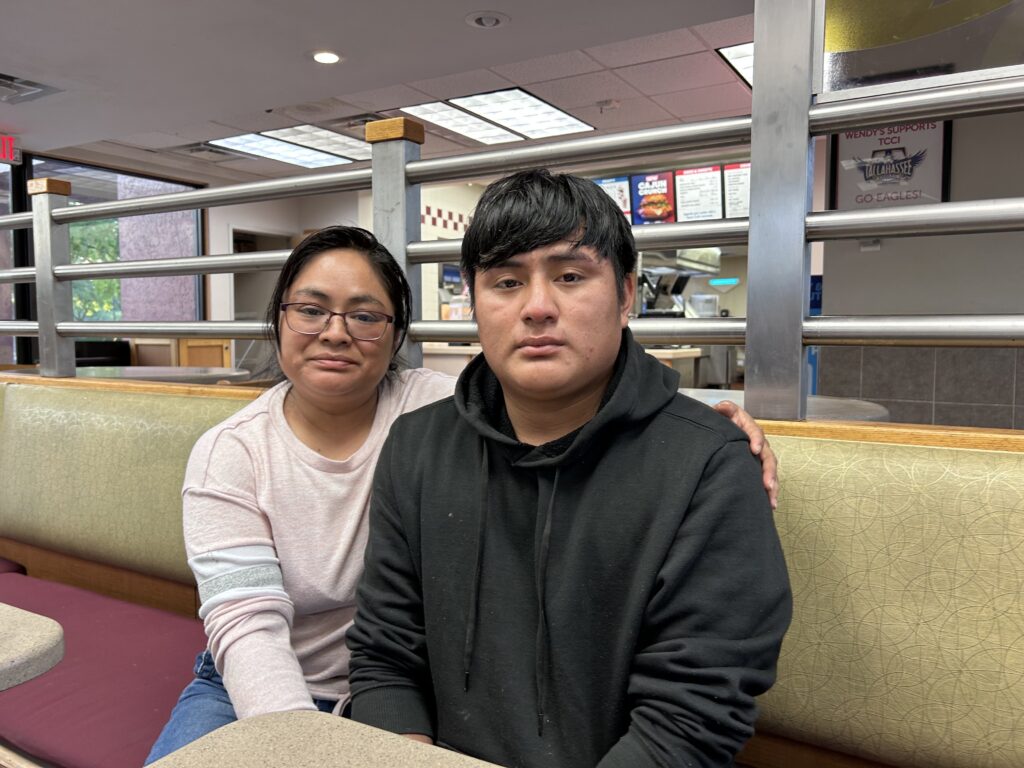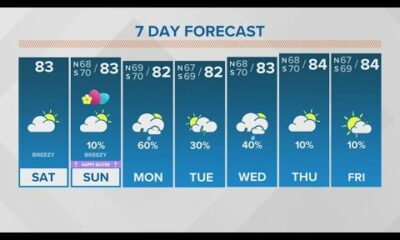News from the South - Florida News Feed
Peanut farmer wants Florida water agency to swap forest land

by Craig Pittman, Florida Phoenix
March 27, 2025
Let me first make it clear that I am a big fan of peanuts — the tasty legume favored by George Washington Carver, that is, and not the Charlie Brown cartoon.
At baseball games, I have eaten dry roasted peanuts a plenty. While driving across Florida, I have munched on soggy brown paper bagfuls of hot boiled peanuts. And of course, as a longtime journalist, I have for years worked for peanuts.
But I am most definitely NOT on the side of the peanuts in an ongoing rhubarb over some state forest land that’s important for several imperiled species.
A state agency, the Suwannee River Water Management District, owns some land known as the Ellaville Tract that’s part of Twin Rivers State Forest. Now there’s a proposed deal to hand over that land to a Georgia peanut farming company. Nearly 700 acres of prime sandhill habitat would be given away.
In exchange, the will give the state 543 acres of its farmland, which sure sounds like an unequal swap just in terms of general acreage.
The Tampa Bay Times broke the story of the swap last week, the same way it broke the story of another idiotic state forest land swap in Citrus County that involved a golf course developer. That one has now apparently stalled.
As for Ellaville, the newspaper reported that the peanut farm’s property has more than 400 acres in a floodplain and lies along a mile of the Withlacoochee River. That’s why water district officials say that gives the peanut farm property “significantly higher” value than the high-and-dry state forest uplands.
One of the first people I talked to when I heard about all this was Katherine Sayler of Defenders of Wildlife. Almost as soon as she learned about the proposed property swap, Sayler pulled on her boots and accompanied a Florida Forest Service employee to look at the supposedly worthless property.
“As soon as we walked out there,” she told me, “we saw there were gopher tortoise burrows.”
She saw white-tailed deer tracks too and heard woodpeckers. She saw healthy wiregrass beds and plenty of longleaf pines, once the magnificent king of the Southern forest, now an embattled presence that’s still hanging on in spots.
But last week, when she told a water district committee about the magnificent bounty of the forest and why it still deserves to be protected, she said, it was as if they didn’t hear her.
Perhaps someone was making too much noise shelling peanuts.
Nature’s condo
The gopher tortoise is a legally protected species in Florida, but you might not know that from the way our state has treated them. Gophers always look like they’re ticked off at us humans, which is kind of understandable.
Gophers became known as “Hoover chickens” in the 1930s, when their plentiful numbers saved a multitude of starving Floridians during the Depression. Herbert Hoover’s Republican Party had promised a chicken in every pot, but there were no chickens to feed the poor, only the tortoises they could catch.
Now the tortoises save scores of other imperiled species from certain doom. Their burrows — up to 40 feet long and 18 feet deep — provide a secluded place to live for about 300 kinds of animals, many of them classified as endangered or threatened. Think of these burrows as nature’s condo.
Unfortunately, the sandy soil where the gophers live is the preferred habitat of a predatory species, the Florida developer.
For 16 years, the Florida Fish and Wildlife Conservation Commission allowed developers to write a check to the state and then run their bulldozers right over the tortoise burrows, sealing up all the wildlife inside to die.
The state handed out 105,000 of these licenses to kill known as “incidental take permits” before biologists reported a problem. Turns out Florida’s tortoise population was dropping like Florida congressman turned National Security Adviser Mike Waltz’s jaw when he found out he’d accidentally added a reporter onto the text chain about secret war plans.
Now the developers are required to get permits to move the gophers before they start construction. This has produced a variety of new problems ranging from the spread of illness among the tortoises to developers who don’t bother to get a permit.
One of the best sites for relocated gophers has been the Nokuse Plantation, a 55,000-acre Panhandle preserve. It was launched by a dirt-road philanthropist named M.C. Davis, whose skills in pool-hustling and poker-playing paid his way through college and law school and made him a tough opponent in negotiations.
The director of Nokuse, Matt Aresco, told me that the state forest property that water district officials want to trade away is an important spot for both gopher tortoises and their frequent tenants, indigo snakes.
Aresco sent me a copy of a 2017 study by the state wildlife commission that found some 440 tortoises on the state forest land. That means it’s like the tortoise equivalent of downtown Tampa.
“For a relatively small property, I’d say 440 tortoises is … a lot of animals,” said Jeffrey Goessling, an Eckerd College biology professor who’s an expert on gopher tortoises and sits on the advocacy group Gopher Tortoise Council.
Aresco also told me this is the second time the water district has tried to give this land away. The first time, M.C. Davis was still alive and among the main opponents.
The old conceits
As Elvis Costello once sang, “History repeats the old conceits, the glib replies, the same defeats.” That’s certainly true with Ellaville.
In 2012, a different peanut farmer cast his covetous eyes on the Ellaville Tract and proposed buying it outright. The water district governing board was keenly interested. However, Davis and other environmental activists, plus the Florida Fish and Wildlife Conservation Commission and the U.S. Fish and Wildlife Service, all objected.
At Aresco’s suggestion, I contacted Eric Draper about what went down in 2012. Draper, a former Florida Park Service director, was then an official with Audubon Florida.
“This one really shocked us,” Draper recalled. “The deal was all worked out by the water management district to sell the land to the peanut farmer. They were going to declare it as surplus and then sell it.”
Under state law, any land bought for conservation must be officially declared to be no longer useful for conservation purposes before the state agency that owns it can get rid of it. The Ellaville Tract had been purchased by the water district as part of a 5,000-acre deal back in 1988. Since then, thousands of dollars in taxpayer money had been used in maintaining it and cultivating the longleaf pines.
Yet, in 2012, the water district board voted to declare the Ellaville Tract was no longer needed for conservation purposes. It was all set to sell it and let the farmer turn it into an ecologically sterile, heavily fertilized peanut production facility.
But then the deal died.
What happened? According to Draper, the opponents found someone to help them whose opinion carried a lot of weight with the gubernatorial appointees on the water board. It was a council of the state’s largest landowners, such as the timber company Rayonier and the cattle giant Lykes Brothers.
Their undeveloped property holds a lot of gopher tortoises as well, Draper told me. The savvy environmentalists pointed out to them that the loss of so many gophers on the Ellaville Tract would likely result in even more pressure for the remaining landowners to keep their own gopher populations intact.
“In a world full of endangered species,” Draper explained, “you don’t want to be the last one with endangered species on your land.”
What’s even more amazing is what happened next. Davis and the others persuaded the state to buy the peanut farm and turn it into conservation land. Instead of a big loss, they turned this into a gain for the environment.
“We think the same should happen this time,” said Julie Wraithmell, executive director of Audubon Florida. “The parcel they want to pick up is definitely worthy, but so too is the Ellaville parcel. It’s an issue of ‘and’ not ‘or.’”
‘A bona fide offer’
Given how this Ellaville-isn’t-needed idea went south last time, I was curious about how it came up again. What was the corporate farmer’s reason for diving into this morass?
“Lee Peanut has expressed interest in this surplus property for some time,” Troy Roberts, spokesman for the water district, told me. “The district received a bona fide offer … in February 2025 and prepared the item for Lands Committee consideration.”
At my request, he sent me a copy of the “bona fide offer” from Lee Peanut, which owns 1,400 acres and processes 5,000 pounds of peanuts per acre per year. But this document doesn’t explain the motivation either. It just says which parcels would be involved, then concludes with, “All of this is contingent on appraisals and negotiations.”
Sayler told me that a farmer representative showed up for the committee meeting where she testified and talked about what a “win-win” deal this would be. But she couldn’t recall him ever explaining why this would be a “win” for the taxpayers who now own the Ellaville Tract or for the nature that now rules over it.
Looking for clues, I checked their parent company Birdsong’s website, which boasted about how they’re “committed to a sustainable future.” I even watched a YouTube video about how they’re being more careful with their fertilizer now that they know it’s a pollutant.
But there was nothing about gopher tortoises, or rather about getting rid of them. That’s what will happen if this deal goes through. State law exempts agriculture from the requirement to move gophers. That means Birdsong/Lee can just plow right over those 440 burrows and bury every single animal inside.
Finally, after several attempts, I was able to get hold of Lee Peanuts manager Garland Brooks. But he made it clear that he didn’t want to answer my questions. He refused to comment for the record and warned me against quoting him. When I persisted in my questions he hung up on me.
I took that as a sign that he couldn’t tell me any good reason why a private company should get public property.
Not just gophers galore
Suwannee River’s spokesman, Roberts, said he didn’t know when this land swap would come up before the board for a final vote. I’m rooting for “never.”
In fact, I’m hopeful the Suwannee River governing board will reconsider its 2012 vote declaring that Ellaville land to be surplus.
Not only does it have gophers galore but also, according to a wildlife commission official quoted by the Times, “swallow-tailed kites, kestrels, eastern indigo snakes, gopher frogs, fox squirrels and the Florida black bear.”
And the Gopher Tortoise Council, in a letter sent to the water district board, pointed out other important species, such as “Florida pine snakes, Southern hognose snakes, Southern fox squirrel, Bachman’s sparrow, Northern bobwhite quail, and many other species. … It’s a popular wildlife-viewing site as a result, with over 95 bird species documented on eBird by visiting birders.”
The idea that the water district board could declare this naturally teeming forest unnecessary for conservation just based on water district goals turns out to be legally shaky.
That’s according to Clay Henderson, a lawyer who has been involved in land conservation in Florida for so long he wrote a book about it called “Forces of Nature.” He told me the law says the water district board must consider more than just floodplains and river frontage in deciding whether the land is still valuable for conservation.
“Clearly this tract continues to have high biodiversity value and accordingly would still be required for conservation purposes,” Henderson told me. “That being the case, there is no reason to look further to determine whether it could be traded for something else. “
Seems to me, then, that any further effort to push this land swap forward would be totally — oh, what’s a good word for it? Oh yeah. Nuts.
YOU MAKE OUR WORK POSSIBLE.
Florida Phoenix is part of States Newsroom, a nonprofit news network supported by grants and a coalition of donors as a 501c(3) public charity. Florida Phoenix maintains editorial independence. Contact Editor Michael Moline for questions: info@floridaphoenix.com.
The post Peanut farmer wants Florida water agency to swap forest land appeared first on floridaphoenix.com
News from the South - Florida News Feed
U.S. small manufacturers hope to benefit from tariffs, but some worry about uncertainty

SUMMARY: Drew Greenblatt, president of Marlin Steel Wire Products, supports the Trump administration’s tariffs aimed at rebalancing trade in favor of U.S. manufacturers. He believes overseas competitors have unfair advantages, creating an uneven playing field for American workers. The administration seeks to revitalize U.S. manufacturing, which has declined by 35% since 1979, by imposing tariffs to encourage local production. However, some small manufacturers, like Corry Blanc and Michael Lyons, express concerns about the resulting economic uncertainty and potential recession. In contrast, Bayard Winthrop of American Giant remains hopeful that tariffs will lead to a resurgence of American-made products.
The post U.S. small manufacturers hope to benefit from tariffs, but some worry about uncertainty appeared first on www.clickorlando.com
News from the South - Florida News Feed
JD Vance goes to the Vatican following remarkable papal rebuke over Trump crackdown on migrants

SUMMARY: U.S. Vice President JD Vance is meeting Vatican Secretary of State Cardinal Pietro Parolin after a papal rebuke of the Trump administration’s immigration policies. Vance, a Catholic convert, has defended these policies through medieval Catholic theology concepts, which Pope Francis directly criticized. The Pope advocates for broader compassion toward migrants, contrasting Vance’s more hierarchical view of care. While in Rome for Easter, Vance attended Good Friday services at St. Peter’s Basilica with his family. He has previously criticized Francis but recently expressed prayers for the Pope’s recovery, highlighting the complex relationship between them on issues of social justice and migration.
The post JD Vance goes to the Vatican following remarkable papal rebuke over Trump crackdown on migrants appeared first on www.news4jax.com
News from the South - Florida News Feed
Federal judge extends block on Florida immigration law that led to arrest of a U.S. citizen

by Jackie Llanos, Florida Phoenix
April 18, 2025
A federal judge brought up the arrest in Leon County of Juan Carlos Lopez-Gomez, a U.S. citizen born in Georgia, during a hearing Friday in which she extended her block of the new Florida immigration law until April 29.
U.S. District Court Judge Kathleen Williams expressed frustration about the arrests of Lopez-Gomez and others, said an attorney representing the immigrants and groups suing the state.
At issue is Williams’ April 4 order temporarily barring enforcement of a law passed during a special session earlier this year making it a first-degree misdemeanor to illegally enter the state as an “unauthorized alien.”
A Florida Highway Patrol trooper’s arrest of Lopez-Gomez on Wednesday prompted national attention following Florida Phoenix’s reports that he was set to remain in jail because U.S. Immigration and Customs Enforcement had placed a 48-hour hold on him — even after a Leon County judge determined there had been no probable cause for the arrest.
Lopez-Gomez was released from Leon County jail on Thursday evening. The 20-year-old held his mother in a tight embrace and wept when they reunited.
“We appreciate that the federal courts have seen through this blatantly unconstitutional law, but the reality is that, without enforcement, it seems that local law enforcement and Florida Highway Patrol are continuing to ignore the judge and order,” said Miriam Fahsi Haskell, an attorney for Community Justice Project representing the plaintiffs, in a phone interview with the Phoenix. “The reality is that once a person is arrested under SB 4C and booked into jail, that person risks then having an ICE hold on them.”
Community Justice Project, the ACLU of Florida, Americans for Immigrant Justice, and Florida Legal Services attorneys are representing the plaintiffs: the Florida Immigrant Coalition, Farmworker Association of Florida Inc., and two women without permanent legal status.
David Matthew Costello, lead attorney representing Attorney General James Uthmeier, declined to comment, and a spokesperson for the attorney general’s office did not respond to the Phoenix’s questions. The other defendants are the statewide prosecutor and state attorneys.
Binding?
During the hearing at the U.S. District Court of the Southern District of Florida in Miami, attorneys representing the state argued that law enforcement is not bound by Williams’ order, Fahsi Haskell said. Another hearing is set for April 29.
“The Court enters a [temporary restraining order] prohibiting Defendants and their officers, agents, employees, attorneys, and any person who are in active concert or participation with them from enforcing SB 4-C,” Williams’ order states.
Two other men were with Lopez-Gomez when the trooper stopped the car because the driver was going 78 mph in a 65 mph zone, according to the arrest report. The driver, Estiven Sales-Perez, and another passenger, Ismael Sales-Luis, were also charged with illegal entry as “unauthorized aliens.” The driver was also charged with driving without a license.
ICE has taken custody of Sales-Perez and is holding him in a Tallahassee field office, according to the online detainee locator system.
“Florida Highway Patrol will continue to work willingly with our federal partners to engage in interior enforcement of immigration law,” a spokesperson for the agency wrote in a statement to the Phoenix.
Florida Democratic Party Chair Nikki Fried called the arrest a kidnapping.
“Where does the lawlessness of this administration stop? If this can happen to an American-born citizen, it can happen to any of us,” she said in a statement.
YOU MAKE OUR WORK POSSIBLE.
Florida Phoenix is part of States Newsroom, a nonprofit news network supported by grants and a coalition of donors as a 501c(3) public charity. Florida Phoenix maintains editorial independence. Contact Editor Michael Moline for questions: info@floridaphoenix.com.
The post Federal judge extends block on Florida immigration law that led to arrest of a U.S. citizen appeared first on floridaphoenix.com
-

 Mississippi Today6 days ago
Mississippi Today6 days agoLawmakers used to fail passing a budget over policy disagreement. This year, they failed over childish bickering.
-

 Mississippi Today6 days ago
Mississippi Today6 days agoOn this day in 1873, La. courthouse scene of racial carnage
-

 Local News6 days ago
Local News6 days agoSouthern Miss Professor Inducted into U.S. Hydrographer Hall of Fame
-

 News from the South - Alabama News Feed5 days ago
News from the South - Alabama News Feed5 days agoFoley man wins Race to the Finish as Kyle Larson gets first win of 2025 Xfinity Series at Bristol
-

 News from the South - Alabama News Feed5 days ago
News from the South - Alabama News Feed5 days agoFederal appeals court upholds ruling against Alabama panhandling laws
-

 News from the South - Florida News Feed7 days ago
News from the South - Florida News Feed7 days agoSevere weather has come and gone for Central Florida, but the rain went with it
-

 News from the South - Alabama News Feed7 days ago
News from the South - Alabama News Feed7 days agoBellingrath Gardens previews its first Chinese Lantern Festival
-

 News from the South - Texas News Feed6 days ago
News from the South - Texas News Feed6 days ago1 dead after 7 people shot during large gathering at Crosby gas station, HCSO says








































